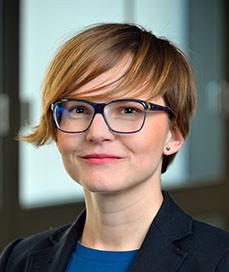
Aleksandra Vojvodic, associate professor of Chemical and Biomolecular Engineering, has been named director of the Penn Institute of Computational Science (PICS).
PICS is a cross-disciplinary institute for the advancement, integration, and support of Penn research via the tools and techniques of high-performance computing.
Prior to joining Penn in 2016, Vojvodic held positions as a Staff Scientist at the SLAC National Accelerator Laboratory and as a Postdoctoral Fellow at Stanford University. She has previously been named a 2017 European Federation of Catalysis Societies Young Researcher Award, 2017 Scialog Fellow, Advanced Energy Storage, 2016 MIT Technology Review TR35 “Top 35 Innovators Under the Age of 35”, 2016–2020 Canadian Institute for Advanced Research Fellow: Bio-inspired Solar Energy.
Vojvodic’s research focuses on theoretical and computational-driven materials design. Her lab uses computational frameworks to obtain fundamental understanding of surface and interface properties of complex materials that can be used to develop theoretical models for chemical transformations and energy conversion. These models have been used to predict new catalyst materials for chemical reactions, several of which have been subsequently synthesized, experimental tested and validated.
Her areas of interest include green chemistry, a field devoted o finding new chemical methods that use and produce less hazardous material and result in less waste, and clean-water chemistry, which entails finding new ways to filter heavy metals and organic compounds from water sources.
In the classroom, Vojvodic has developed a new course, Computational Science of Energy and Chemical Transformations, to teach graduate and advanced undergraduate students the fundamentals of computer-based atomic-scale modeling. Vojvodic also provides students a rare opportunity to try these techniques for themselves, using an educational allotment of her National Science Foundation supercomputer time. The class culminates in a final project in which students work on real-world problems in catalysis and energy.
“Aleks has an incredible track record of scholarship in the computational design and theoretical understanding of catalytic interfaces and nanoscale materials important to the development of chemical transformations and energy conversion technologies,” says Cherie Kagan, Associate Dean for Research and Stephen J. Angello Professor of Electrical and Systems Engineering and Materials Science and Engineering. “She has shown great leadership in computational research and teaching at Penn and a commitment to the professional development of our diverse body of students. Aleks will be a great leader for PICS.”
